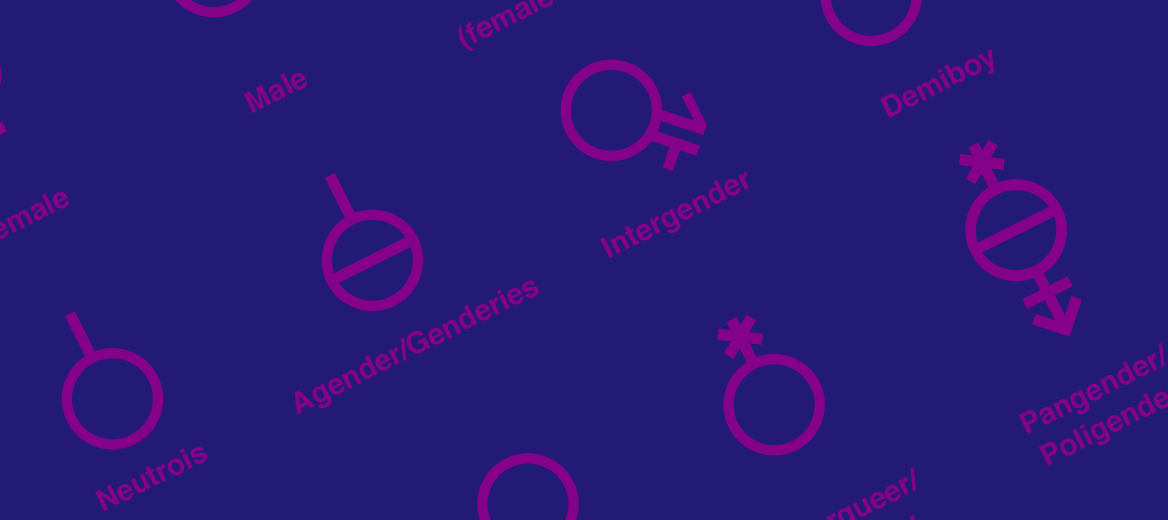Health + Wellness
Understanding Different Types of Relationships to Find What Works for You

No two people are exactly alike,and neither are any two relationships, whether platonic, romantic, sexual or a combination. Knowing and defining your relationship status is important not just for your dating app profile, but also so you and your partner or partners are on the same page for what you want and can expect from each other.
Different people have different standards and expectations when it comes to intimate or sexual relationships. We’re here to help you navigate these types of relationships, whether you’re exploring your own preferences – or looking for conversation starters to discuss what you and your partner want from your relationship.
Different Types of Intimate Relationships
Intimate and sexual relationships can take many forms, including monogamy, serial monogamy, polyamory, open relationships or friends with benefits. These are just labels, and the people in the relationship can pick any or none of them.
Remember that relationships are between the two (or more) people in them and not between those people and their friends, families, or followers. If labels help you define what you are to each other, great, but you are under no obligation to choose a relationship type based on those labels or definitions.
It's much more important that you and your partner(s) discuss the boundaries in your relationship, including whether you will or won't have other sexual partners, and come to a mutually agreed-upon understanding. This will help you avoid relationship pitfalls and can provide necessary common ground, especially for people in long-distance relationships.
Also remember that any type of relationship can be among any combination of sex, gender, and sexual orientation and that's okay, if everyone in them is a consenting adult.
What is Monogamy?
Monogamy is the practice of having only one sexual or romantic partner at a time. Monogamous couples can be married or not married - the partners just agree that they will not have sex with anyone else while they are in this relationship. If either does, that's cheating.
Partners in truly monogamous relationships do not engage in any sexual behavior outside of each other. Monogamy can cut down on the risk of sexually transmitted infections if both partners commit to avoiding other sexual relationships.
What is Serial Monogamy?
Serial monogamy is the practice of having many monogamous relationships in succession-one right after the other. You're only with one partner at a time. Note that serial monogamists come in many forms.
For example, serial monogamy can be someone who tends to engage in frequent 3-month relationships in quick succession. Alternatively, a serial monogamist might be that person you know who is seemingly “never single” and constantly jumps from one long-term relationship right into the next one. It’s important to avoid judgment and respect boundaries – some people desire that kind of intimate relationship on a more regular basis.
However, you should also know that jumping from one monogamous partner to another can be a risk factor for STIs if partners don't use condoms as it can take time for STI symptoms to show up (and many never have symptoms). People who practice serial monogamy should commit to safer sex and condom use with each new partner at least until they have been tested for all STIs and gotten a clean bill of health or finished treatment.
What Does Dating Exclusively Mean?
Dating exclusively usually means that a couple has decided not to date (or have sex with) anyone else but is not quite ready to declare themselves "in a relationship." This is often the first commitment a couple makes and may be a step on the way to declaring monogamy.
What is Non-Monogamy?
Non-monogamy is any intimate relationship that includes more than one sexual or romantic partner. Non-monogamy spans several different types of relationships.
For this definition, we are going to refer to ethical non-monogamy (ENM). Naturally, unethical non-monogamy would be considered cheating since, presumably, there would not be an agreement between the non-monogamist and their partner.
What is an Open Relationship?
An open relationship is an agreement between partners that they can have intimate/sexual contact with other people. With married couples, this is often referred to as swinging. You may hear terms like “stag” or “vixen” with people in an open relationship.
In some open relationships, partners let each other know when they hookup with someone else, while others prefer not to know about it. When it comes to safer sex, partners in an open relationship are more at risk for Sexually Transmitted Infections than those in truly monogamous relationships, and should wear condoms with outside partners and maintain a regular practice of getting tested for STDs.
What is Hotwifing?
“Hotwifing” often refers to a woman who has been granted permission by her husband or partner to have sex with other men, known as their “bulls.” Often, the man in a hotwife relationship gets gratification from knowing his wife/partner is having sex with other men. Hotwifing is often also called “cuckolding.”
Hotwifing is different from swinging since swinging involves both partners having intimate or sexual contact with other people. In this case, the hotwife is the only one having sex with other people, though they may bring in other sexual partners and participate in sexual activities with their husband.
Additionally, “hotwifing” may involve the husband watching or recording the physical intimacy since it can serve as a major turn-on that they may get off to later. Make sure all parties consent to being watched or taking any pictures or videos during the sexual encounter.
It’s important to note that hotwifing is strictly based on physical connections. A hotwife may have sex with other men, but she and her husband will still have the strongest emotional and romantic bond.
What is Polyamory?
Polyamory is the practice of being in (or open to) romantic/sexual relationships with more than one person at a time. This is different than an open relationship in which romantic partners agree to have sex with outside people. People who are polyamorous have more than one committed romantic or sexual relationship at the same time.
Types of Polyamory
A poly relationship can take many forms. Like any other relationship, it doesn't necessarily need a label – though there is a definition for the group of people involved with each other in a polyamorous relationship, which is “polycule.” Regardless, there are different types of relationships within polyamory itself:
A “throuple,” also known as a triad, is a polyamorous relationship involving three partners who are all committed to each other sexually and romantically. This may even extend to four, or a quad. And no, those are not the same as “threesomes” or “foursomes” – those terms usually refer explicitly to sexual encounters between a group of three or four.
A “vee” is a polyamorous relationship where one person as the pivot or at the center of separate relationships. The “V” is involved with 2 or more partners, but those partners are not involved with each other (A is with B, B is with C, but A and C are not with each other). The partners of your partner(s) that you are not romantically involved with are known as metamours.
Kitchen Table Polyamory is the definition for all partners and metamours in a polycule (the group of people involved with each other) are open and friendly.
Hierarchical Polymary occurs when the relationship is organized so that one partner is considered "primary" and others are "secondary."
The most important part of polyamory is open communication and consent. Everyone involved in the relationship must be aware of the dynamics, agree to them, and have the power to renegotiate the terms to have their feelings heard and their needs met. Open communication and consent are important for all intimate relationship types, not just polyamory!
Polyamory vs. Polygamy
Polygamy means having more than one legally married spouse and is defined by those legal constructs. Polyamorous relationships may include a primary couple who is officially married and then each person in the relationship may also have another partner or partners that they are committed to but not married to.
What Does FWB Mean?
The acronym “FWB” means Friends with Benefits and usually refers to a couple that has sex regularly but isn't in a romantic relationship. FWB relationships can be a lot of sexy fun, but they can get tricky if one partner wants more or meets someone else. Communication and consent are extra important between FWBs.
When making decisions about contraception and safer sex, it's also important to know if your FWB has any other FWBs. Being honest with each other can help make sure you'll still be friends, even if you drop the benefits part someday. Some relationships that begin with the FWB distinction may develop into a monogamous relationship or a different type of sexual/romantic relationship altogether.
What Does Hooking Up Mean?
Most people use the term “hooking up” to mean sex of some kind with someone they're not in a romantic relationship with. But that term can mean different things to different people.
Some people might consider “hooking up” as having a sensual makeout with someone at a party or music festival. And a hookup might not mean penetrative sex – engaging in oral sex with someone could be considered a hookup.
Hookups tend to be casual sex without romantic feelings but as we all know, relationships can change! A hookup can be a one-night stand or the start of some other kind of relationship.
And what starts out as friends with benefits could go through a dating-exclusively phase on its way toward marriage. Or, the reverse could be true, exes who were once monogamous could decide to see other people but remain friends with benefits.
What is the Meaning of LDR?
The term LDR is short for Long Distance Relationship, or when partners don't live near each other. Jobs, schools, or family obligations mean that they cannot live in the same place (at least for now) but they are committed to each other nonetheless.
LDRs can be difficult with partners feeling lonely or disconnected between visits, but with texting/sexting and sometimes steamy video calls, technology has definitely made these arrangements a lot more manageable.
Defining Your Own Relationship Boundaries
These definitions can give you an idea of the different types of relationships that are most common or most talked about. The truth is every intimate relationship is different and the only people who can define it are the two (or more people) who are in it. You have to decide what works for you, talk about it with your partner(s), make sure you're on the same page, and then stick to whatever arrangement you've made.
It can help to set relationship boundaries-an agreed-upon set of do's and don'ts for your relationship. This isn't about controlling the other person's behavior outside of the relationship but setting up guidelines to help make sure everyone feels comfortable and respected. While we often think about boundaries in terms of sex, there are lots of other aspects of a partnership that could benefit from discussion ahead of time. Here are some things to think about:
Monogamy? The most basic question that couples need to decide on involves whether they are going to date and/or have sex with other people. It sounds straightforward but remember that some people have different ideas of monogamy. Is any sexual behavior okay? What about flirting or sexting? Talk it out and agree on what's in bounds.
Safer Sex? Couples should discuss early on whether they plan to use condoms and/or other birth control methods and for how long. The answer to the monogamy question will likely affect the answer to this question as your risk of STIs is lower in a truly monogamous relationship (once both partners have been tested, of course).
Time Together? How much time are you going to spend together? How many sleepovers? Do you want some time in your own space each week?
Money? Who is going to pay for what; is it split 50/50 or based on some other formula? Or, for couples who have been together a long time, are you going to mix your money or keep separate accounts but share expenses?
Moving forward? Some relationships will be the same year after year while others will move through stages-from FWB to dating exclusively to monogamous or from monogamy to an open or polyamorous relationship. Relationship problems often happen when one person is satisfied with the status quo, and another is hoping to take the next step.
Remember, all these boundaries can be renegotiated once or many times over the course of the relationship, and partners are always allowed to change their minds about what they want. Honest communication is the key to a successful relationship-talking about it all in advance and getting everyone's consent can prevent jealousy, anger, and hurt feelings.





